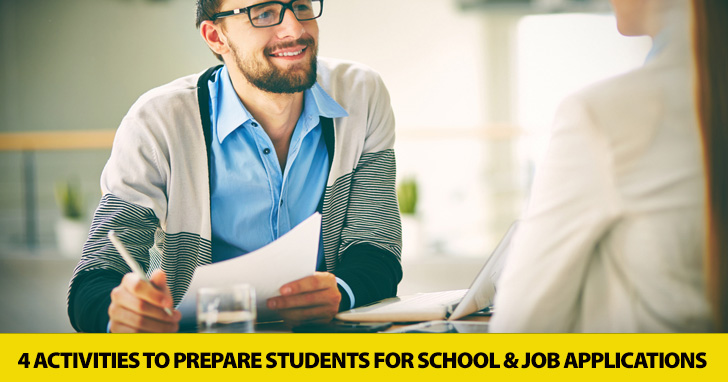You’re Hired! 4 Activities to Prepare Students for School and Job Applications


They hope to use English in either their careers or to further their educations. Those who learn English for their academic futures often attend language programs or take pre-collegiate level English courses before applying to higher educational institutions. For that reason, using the college application process as content for your English classes just might be a natural fit; it gives your students practical experience with language and the application process as well. If you have students who may be applying to college in the near future, here are some ways you can get them ready to apply to school as they apply their English language skill in the classroom.

Choosing a college or a few colleges is the first step in the college application process. If a student knows what she intends to study, she may be able to find an educational institution that fits well with her academic goals. Many students, though, do not know what they intend to study. For those students, other factors like size, location and price may be the deciding factor when choosing a university. Before your students choose one or more schools for their applications, have them work with a partner to determine what criteria they will use when choosing a school to attend. Explain that the word criteria refers to the items or issues a person considers when making a decision. Encourage each of your students to have five criteria for choosing the right college (size, location, courses of study, cost, etc.). Then, have them rank those criteria in order of importance. Remind your class that each person will have a unique set of criteria for choosing the right college based on her individual needs, and that criteria for colleges should be unique to each individual though there may be some commonalities among your students.
Now that your students know what they are looking for, it is time to start looking for schools. Using a web site like College Navigator can be of great assistance in finding the right schools to look at. By answering a few simple questions, each person can generate a list of schools that meet some if not all of their criteria for the right school. Now your students will have to read for detail about each school to determine which, if any, meet all of their criteria. Simply click on one of the schools that came up in your search and read more about it. Encourage your students to narrow their list based on their criteria. Once each person has no more than three schools on her list, have her work with a partner to explain why she chose the schools that she did for her applications.
Now that your students know the schools to which they want to apply, it is time to look at the application itself. By the time they are applying for colleges, your students should have the basic literacy skills to fill out a form that asks for general information. Along with that information, though, most schools will require one or more essays. Many of these essays focus on topics such as why this school you want to attend or what you intend to do with your future. Have groups of around four or five students work together to list all the different topics on which their potential schools are asking for essays. Challenge groups to notice any topics that more than one school ask for. Then have the groups strategize how they might go about answering each of the essay questions. This may be a good time to review the different organizational strategies a writer can use in an academic essay. Ask each group to choose two of the questions and write a brief outline explaining how they would answer the questions. If you like, ask each student to write an essay that answers one of the questions from a school she has chosen.
Many students find that the college interview is the first interview they have experienced. For students who speak English as a second language, the interview can be even more intimidating than it is for a native speaker. Giving those students a chance to practice what they might say during an interview will help them feel more at ease so as not to hinder their fluency when it is time for the interview that counts. Pair students together and then give them this list of twelve questions to be ready for on a college interview. Each question offers suggestions on what to say and what not to say, so encourage your students to think about how they might answer each question. Then have each pair role play a mock interview, one person selecting three or four of the questions and having the other person answer. Then switch roles for the second interview. If possible, you may want to have another student listen in on the interview and make notes about any grammatical or content issues for each speaker.
Once your students feel comfortable with the schools they have chosen, filling out the application, writing the essay, and doing the interview, they are ready to tackle the college application process in earnest. Encourage each person to choose at least three schools for their applications – a school that will definitely take them (a safe school), a school that will probably take them, and a school that may not take them (a reach school). Since many colleges no longer require application fees due to online applications, your students have nothing to lose by keeping their options open and applying to several schools. You can support your students by offering to read any essays and give feedback before they submit it to their schools. If you like, you can celebrate their accomplishments by watching one of the many college themed movies available today.
How many of your ESL students plan on attending English speaking colleges and universities?